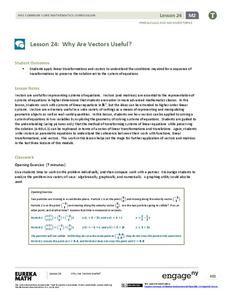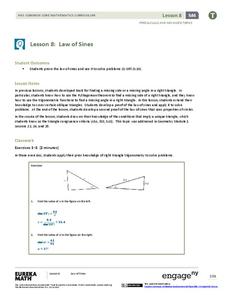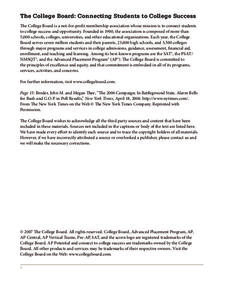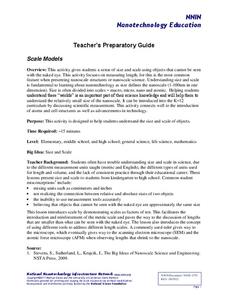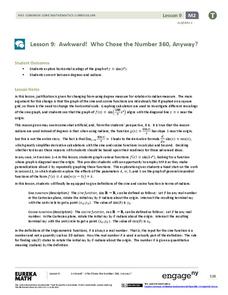EngageNY
Discovering the Geometric Effect of Complex Multiplication
Does complex number multiplication have the class spinning? Here's a resource that helps pupils explore and discover the geometric effect of multiplying complex numbers. In the 14th installment in the 32-part unit groups look at the unit...
EngageNY
Getting a Handle on New Transformations 2
Use 2x2 matrices to move along a line. The second day of a two-day lesson is the 28th installment in a 32-part unit. Pupils work together to create and solve systems of equations that will map a transformation to a given...
EngageNY
When Can We Reverse a Transformation? 3
When working with matrix multiplication, it all comes back around. The 31st portion of the unit is the third lesson on inverse matrices. The resource reviews the concepts of inverses and how to find them from the previous two lessons....
EngageNY
Why Are Vectors Useful? 2
Investigate the application of vector transformations applied to linear systems. Individuals use vectors to transform a linear system translating the solution to the origin. They apply their understanding of vectors, matrices,...
EngageNY
Law of Sines
Prove the Law of Sines two ways. The ninth segment in a series of 16 introduces the Law of Sines to help the class find lengths of sides in oblique triangles. Pupils develop a proof of the Law of Sines by drawing an altitude and a second...
Curated OER
Tiles, Blocks, Sapphires & Gold: Designing a Treasure Map
Young cartographers in groups hide treasure at school and then create a map to find it using pattern blocks and tiles. They make paintings with clues to create a visual representation of the location of their treasure. Groups present...
Learner
Solid Shapes
A collection of two lessons, kindergartners will identify two-dimensional shapes in solid shapes. They will develop basic knowledge of the components that make up a sphere, rectangular prism, pyramid, cylinder, cone, and cube. Young...
College Board
Extrema
No need to go to extreme lengths to find resources on extrema. The central focus of an AP® curriculum module is on critical points and extrema, and how to cover these concepts throughout the course. A set of three worksheets helps assess...
Curated OER
Cutting Corners - Parts 1 and 2
Students use optimization concepts to design their own container. For this optimization lesson plan, students understand how the optimization concept is critical in calculus and why products are packaged the way they are.
Curated OER
Yummy Gummy Subtraction
Here is a quick 15 minute instructional activity intended to introduce subtraction. Learners count and subtract gummy bears to complete 5 problems. The lessons suggest that the gummy bears can be saved and used the next day, but gummy...
Key Curriculum Press
Applications of Exponential Functions
Exponential functions are the name of the game. Young mathematicians can work through each of the eight worksheets by evaluating functions, applying logarithms, completing logarithmic functions, and building inverse functions. This...
Curated OER
Solving Equations by Factoring
In this algebra worksheet, learners use the Zero Product Property to solve polynomial equations by factoring. Application problems are included. The one page interactive worksheet contains fifty-four problems. The...
HHS Math
Assignment 1.6: Solving Quadratic Equations
Practice solving different types of quadratic equations with these three worksheets. Problems include equations already factored, simple square root problems, and problems requiring different factoring techniques where the highest degree...
College Board
Sampling Distributions
The validity of data depends on the strength of the sample. A collection of instruction and activities focuses on sampling distributions and the analysis of that data. Scholars learn about distribution tests such and Central Limit...
Curated OER
Discovering Pi
Define terminology related to a circle. Practice accuracy in measuring and then create a spreadsheet based on data collected from solving for parts of a circle. Groups can have fun analyzing their data as it relates to Pi.
Natinal Math + Science Initative
Slope Investigation
Context is the key to understanding slope. A real-world application of slope uses a weight loss scenario with a constant rate of change to introduce the concept of slope of a line, before it makes a connection to the ordered pairs...
EngageNY
Linear Transformations Applied to Cubes
What do you get when you combine a matrix and a cube? Well that depends on the matrix! Pupils use online software to graph various transformations of a cube. Ultimately, they are able to describe the matrix that is responsible for a...
EngageNY
Composition of Linear Transformations 1
Learners discover that multiplying transformation matrices produces a composition of transformations. Using software, they map the transformations and relate their findings to the matrices.
EngageNY
Composition of Linear Transformations 2
Scholars take transformations from the second to the third dimension as they extend their thinking of transformations to include three-dimensional figures. They explore how to use matrices to represent compositions of...
Curated OER
Asking For Directions
For this asking questions worksheet, students solve a word problem involving asking the minimum number of questions for directions. Students complete 1 complicated higher order thinking problem.
National Nanotechnology Infrastructure Network
Scale Models
With instructions to adapt the activities for any grade K-12, any teacher can incorporate the concept of scale into the classroom with a simple, yet effective lesson.
EngageNY
Equivalent Rational Expressions
Rational expressions are just fancy fractions! Pupils apply fractions concepts to rational expressions. They find equivalent expressions by simplifying rational expressions using factoring. They include limits to the domain of the...
EngageNY
Linear Systems in Three Variables
Put all that algebra learning to use! Using algebraic strategies, learners solve three-variable systems. They then use the three-variable systems to write a quadratic equation given three points on the parabola.
EngageNY
Awkward! Who Chose the Number 360, Anyway?
Don't give your classes the third degree. Use radians instead! While working with degrees, learners find that they are not efficient and explore radians as an alternative. They convert between the two measures and use radians with the...





